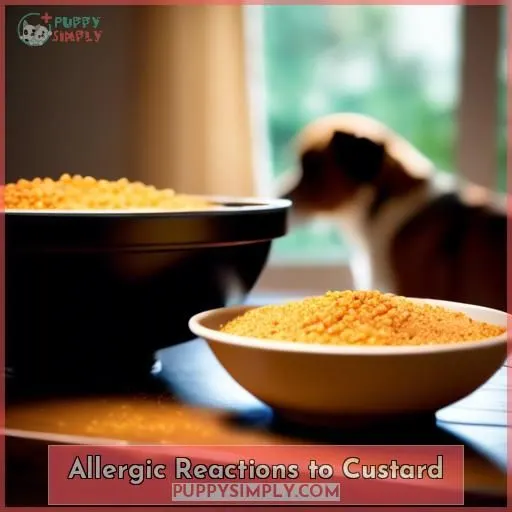This site is supported by our readers. We may earn a commission, at no cost to you, if you purchase through links.

You may be tempted to share your creamy custard dessert with your pup, but it’s best to avoid feeding custard to dogs.
Custard contains dairy, sugar, and other ingredients that can lead to digestive issues, weight gain, and even pancreatitis in our furry friends.
While a small taste likely won’t cause immediate harm, regularly giving custard treats to dogs is inadvisable.
Lactose intolerance is common in dogs too.
However, there are healthier alternatives you can explore to satisfy your pup’s sweet tooth without compromising their well-being.
Keep reading to learn more about why custard poses risks and safer options for doggy delights.
Table Of Contents
- Key Takeaways
- Can Dogs Eat Custard?
- Can Dogs Eat Custard?
- Fresh Custard for Dogs
- Frozen Custard for Dogs
- Custard Tarts for Dogs
- Custard Creams for Dogs
- Is Custard Bad for Dogs?
- Allergic Reactions to Custard
- Toxic Ingredients in Custard
- Digestive Issues From Custard
- Alternatives to Custard for Dogs
- Frequently Asked Questions (FAQs)
- Conclusion
Key Takeaways
- Custard contains dairy, sugar, and other ingredients that can lead to digestive issues, weight gain, and even pancreatitis in dogs.
- Fresh custard can be a delightful treat for dogs, but it’s vital to take into account their lactose intolerance and the possible digestive problems that may arise.
- Frozen custard is not advised for dogs due to its substantial sugar and fat content, which can lead to weight gain and obesity.
- Custard tarts are a popular dessert, but their high calorie density, fat content, and sugar can be harmful to dogs, potentially leading to weight gain and other health issues.
Can Dogs Eat Custard?
No, dogs should not eat custard as it can be unhealthy and potentially toxic due to ingredients like xylitol and high levels of sugar and fat. While custard isn’t inherently toxic, it’s not recommended for dogs, especially in large amounts or as a regular part of their diet.
Can Dogs Eat Custard?
You might be whipping up a batch of homemade custard, sifting through custard recipes, or simply indulging in a custard tart, and there it is – those puppy eyes begging for a taste.
But can dogs eat custard?
Let’s explore the custard bowl and find out. Custard, with its rich history and creamy delight, might seem like a harmless treat. However, custard ingredients often include things not so friendly to our furry friends.
While a lick or two won’t send them to doggy emergency, it’s not the best snack choice. Custard nutrition for dogs is a bit of a misnomer, as the sugar and dairy can lead to tummy troubles.
So, next time, maybe opt for custard alternatives that’ll keep that tail wagging without the worry.
Fresh Custard for Dogs
Fresh custard can be a delightful treat for your dog, but it’s vital to take into account their lactose intolerance and the possible digestive problems that may arise. Here are some key points to keep in mind when offering fresh custard to your dog:
- Lactose Intolerance: Most dogs lose the ability to digest lactose after puppyhood, which means they can’t effectively break down the lactose in milk and dairy products. This can lead to digestive issues such as vomiting, diarrhea, and abdominal pain.
- Homemade Options: If you wish to make fresh custard for your dog, consider using lactose-free milk or alternatives like coconut milk or almond milk. You can also experiment with lactose-free creams and use cornstarch as a thickener instead of dairy-based thickeners.
- Serving Size: Keep the serving size small to avoid overwhelming your dog’s system with lactose and sugar. A small lick or taste is acceptable, but avoid making it a regular part of their diet.
- Occasional Treats: Fresh custard can be given as an occasional treat, but remember that excessive sugar and fat can contribute to weight gain and health issues.
- Xylitol and Other Harmful Ingredients: Always check the ingredient list for any toxic ingredients like xylitol, which is highly toxic to dogs. Chocolate-flavored custard should also be avoided, as chocolate is poisonous to dogs.
Frozen Custard for Dogs
Frozen custard may appear like a cool treat for your canine companion, but it’s not advised for dogs. It’s fundamentally just standard custard that’s frozen, hence it carries the same warnings and potential problems as any other type of custard. The substantial sugar and fat content can lead to weight gain and obesity, and the dairy content can cause digestive distress.
If you’re seeking a frozen treat for your dog, consider healthier choices like doggy ice cream or frozen fruit. These treats can offer a cool and tasty alternative without the potential digestive issues. Bear in mind, portion control is crucial in relation to treats, and frozen treats should only constitute a small fraction of your dog’s daily diet.
Custard Tarts for Dogs
Custard tarts are a popular dessert.
However, their high calorie density, fat content, and sugar can be harmful to dogs.
While a small treat won’t likely cause immediate harm, regular consumption can lead to weight gain, joint disease, and other health issues.
Some custard tarts may contain nutmeg, which is toxic to dogs.
If you’re considering sharing a custard tart with your furry friend, consider healthier alternatives like fresh fruit or vegetables.
Custard Creams for Dogs
Custard creams are a popular treat, but are they safe for your furry friend? Let’s venture into the realm of custard creams for dogs.
Custard creams are calorie-dense, sugary, and fatty. A single custard cream supplies a quarter of a small dog’s daily caloric intake, potentially leading to weight gain and obesity. Here’s a concise summary of what you should know:
- High Calorie Count: One custard cream contains approximately 100 calories, which is substantial for a small dog.
- Sugar Surge: These treats are abundant in sugar, which can contribute to tooth decay and other health problems.
- Fatty: The high fat content can cause digestive issues and may lead to pancreatitis in some dogs.
If you’re seeking healthier alternatives, consider these options:
- Christmas Pudding: A small portion of plain, unsweetened yogurt or pumpkin puree can be a tasty and healthier alternative.
- Fruit Treats: Banana mash or unsweetened applesauce can be a fantastic choice for a sweet treat without the added calories and sugar.
Is Custard Bad for Dogs?
Custard, a velvety and creamy dessert made with eggs, milk/cream, sugar, and vanilla, can be an enticing treat for your furry pal. But is it harmless for them? Here’s the scoop:
First off, custard can pack a punch of sugar and fat, which can lead to extra pounds and chubbiness in dogs. Portion control is key, and it’s best to dish out custard sparingly as a special treat.
Secondly, the dairy in custard can give dogs tummy troubles, especially those who can’t handle lactose. This can lead to digestive woes like diarrhea and an upset stomach.
Thirdly, custard might’ve sneaky ingredients like Xylitol, an artificial sweetener that’s a no-no for dogs. Always scan the ingredient list and dodge any harmful additives.
Last but not least, keep in mind that custard isn’t a staple in a dog’s grub. As a responsible pet parent, you should prioritize weight management and offer a well-balanced diet that meets your dog’s nutritional needs.
Allergic Reactions to Custard
While custard itself isn’t poisonous to dogs, it can still trigger allergic reactions. Some dogs may be unable to tolerate lactose, meaning they experience challenges digesting dairy products like milk and cream found in custard. This can result in digestive problems such as vomiting, diarrhea, and stomach upset. Additionally, custard is rich in sugar, which can contribute to weight gain and obesity in dogs if consumed in excess. Hence, it’s imperative to manage your dog’s weight and only provide custard as an occasional indulgence.
Here are four key points to bear in mind:
- Lactose intolerance: Dogs with this condition may encounter difficulties digesting dairy products in custard, leading to digestive issues.
- Weight management: Custard’s high sugar content can contribute to weight gain if given in large amounts.
- Alternatives: Choose healthier treats like fruit or vegetables instead of custard.
- Moderation: Even if your dog isn’t lactose intolerant, it’s essential to limit custard consumption due to its high sugar content.
Toxic Ingredients in Custard
Xylitol and Raisins
Custard, while not inherently toxic to dogs, can contain ingredients that are harmful. Two such ingredients are Xylitol and raisins.
Xylitol is a sugar substitute commonly found in sugar-free products, including some custards. It’s highly toxic to dogs, causing hypoglycemia, seizures, liver failure, or even death. Even small amounts can be dangerous, and the severity of the poisoning depends on the amount ingested. If your dog has consumed a product containing xylitol, contact your veterinarian promptly.
Raisins, often found in custard tarts, are toxic to some dogs. They can cause catastrophic kidney failure, with symptoms appearing 6-48 hours after ingestion. If you suspect your dog has eaten raisins or grapes, contact your veterinarian promptly.
To safeguard your dog’s well-being, always check the ingredient list of any food you give them. Choose healthier alternatives, such as plain unsweetened yogurt, pumpkin puree, banana mash, or unsweetened applesauce. These options provide a creamy texture and delicious taste without the potential risks associated with custard.
Digestive Issues From Custard
After exploring the potentially toxic ingredients in custard, let’s examine the digestive challenges it can present to our furry companions.
Custard, while a creamy indulgence for us, can be a tumultuous experience for a dog’s stomach. If your pup is lactose intolerant, even a taste can result in a stomach upset, leaving a rather unappetizing aftermath.
Additionally, the high fat and sugar content in custard could be a direct path to weight gain or, even more concerning, obesity.
For the less fortunate canines, indulging in this dessert could trigger pancreatitis, a condition that you certainly don’t want to introduce to your pet’s table.
Therefore, while sharing is an act of kindness, in the case of custard, it’s wise to savor your treat alone and resist the temptation to gratify those puppy-dog eyes.
Alternatives to Custard for Dogs
Seeking some nutritious and delectable replacements for custard for your furry companion? Here are four possibilities to contemplate:
- Homemade Dog Delicacies: Concoct some delectable homemade treats using natural components such as peanut butter, pumpkin, and oats. These treats aren’t just more wholesome but also a delightful method to cultivate a bond with your dog.
- Frozen Fruit: Freeze some fruit, such as bananas or berries, and present them as a cool and revitalizing treat. This can be an excellent way to deliver additional hydration and nutrients.
- Yogurt Substitute: Plain, unsweetened yogurt can be a suitable option for dogs who can tolerate dairy. Greek yogurt, specifically, contains a higher protein content and lower lactose levels, making it a superior choice.
- Calorie-Mindful Treats: When selecting store-bought treats, seek out alternatives that are low in calories and made with whole-food components. Some brands provide treats that are enriched with nutrients such as omega-3 fatty acids, which can be advantageous for your dog’s well-being.
Frequently Asked Questions (FAQs)
Can custard cause digestive issues in dogs?
Yes, custard can potentially cause doggy tummy troubles. That creamy deliciousness packs a punch with its dairy and sugar content – a recipe for digestive distress if your pup overindulges. Let’s stick to puppy-approved treats to keep that furry belly happy!
Is it safe to feed custard to dogs with lactose intolerance?
You’re playing a dangerous game, my friend! Feeding lactose-laden custard to your pup with a sensitive tummy? Brace for a gastrointestinal symphony you won’t soon forget!
How often can dogs have custard as a treat?
You really shouldn’t give your pup custard too often. An occasional small lick as a rare treat is okay, but that rich, sugary custard can really mess with a dog’s tummy if overdone. Stick to doggy-approved goodies for frequent treating instead.
What are some healthier alternatives to custard for dogs?
Frozen yogurt, mashed banana or pumpkin ‘nice cream,’ homemade unsweetened applesauce – these delicious, dog-friendly treats satisfy that sweet tooth safely. Simple swaps keep your pup healthy and happy!
Can custard creams be given to dogs in small amounts?
No, you shouldn’t give your pup custard creams. They’re loaded with sugar and fat that can really mess with their digestive system and cause weight gain. Let’s stick to healthier, dog-friendly treats to keep your furry friend feeling their best.
Conclusion
Carefully considering whether can dogs eat custard, it’s clear this creamy confection poses potential perils for pups. Prioritize your pooch’s wellbeing by providing pet-friendly alternatives that satisfy their sweet cravings safely. With diligence and devotion, you’ll delight your furry friend without compromising their health.















